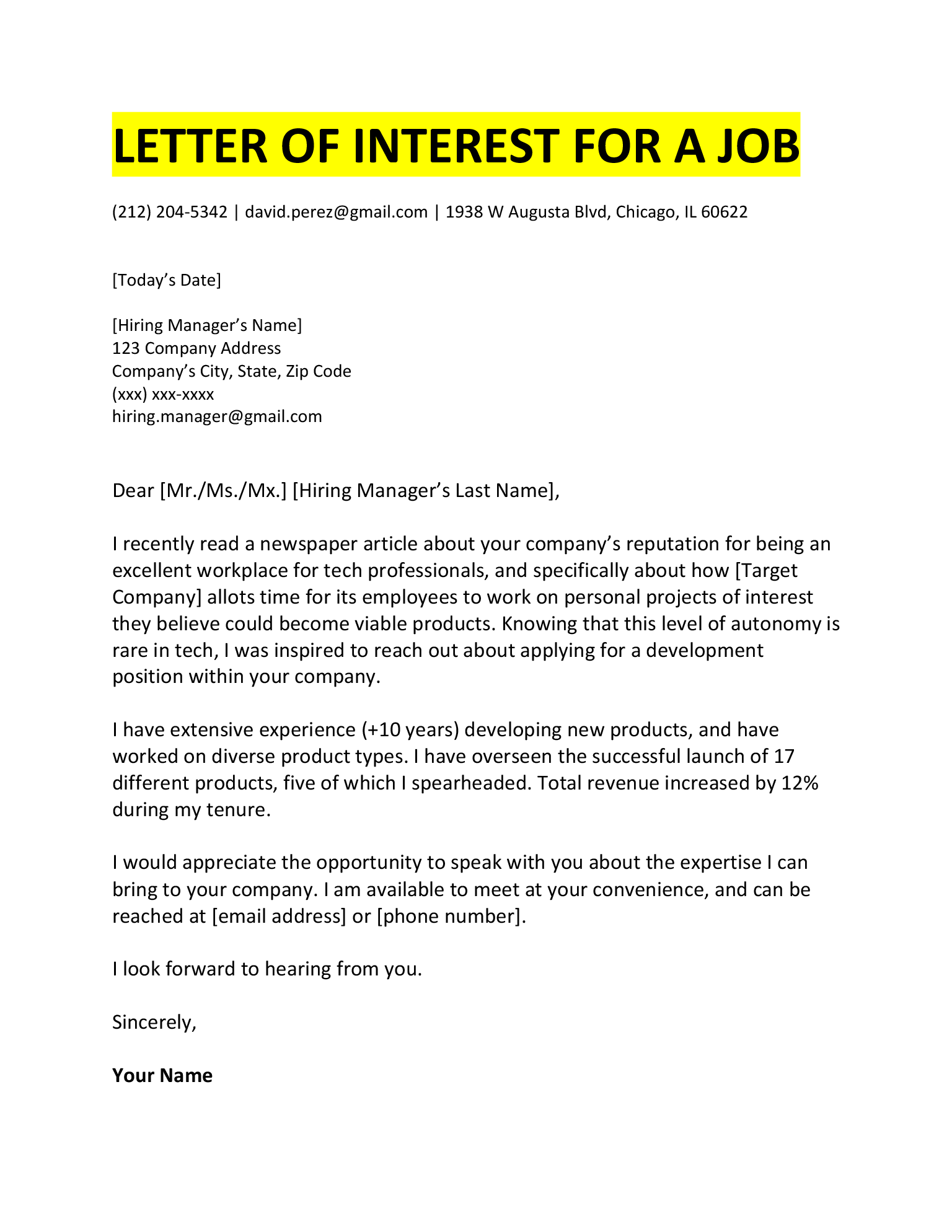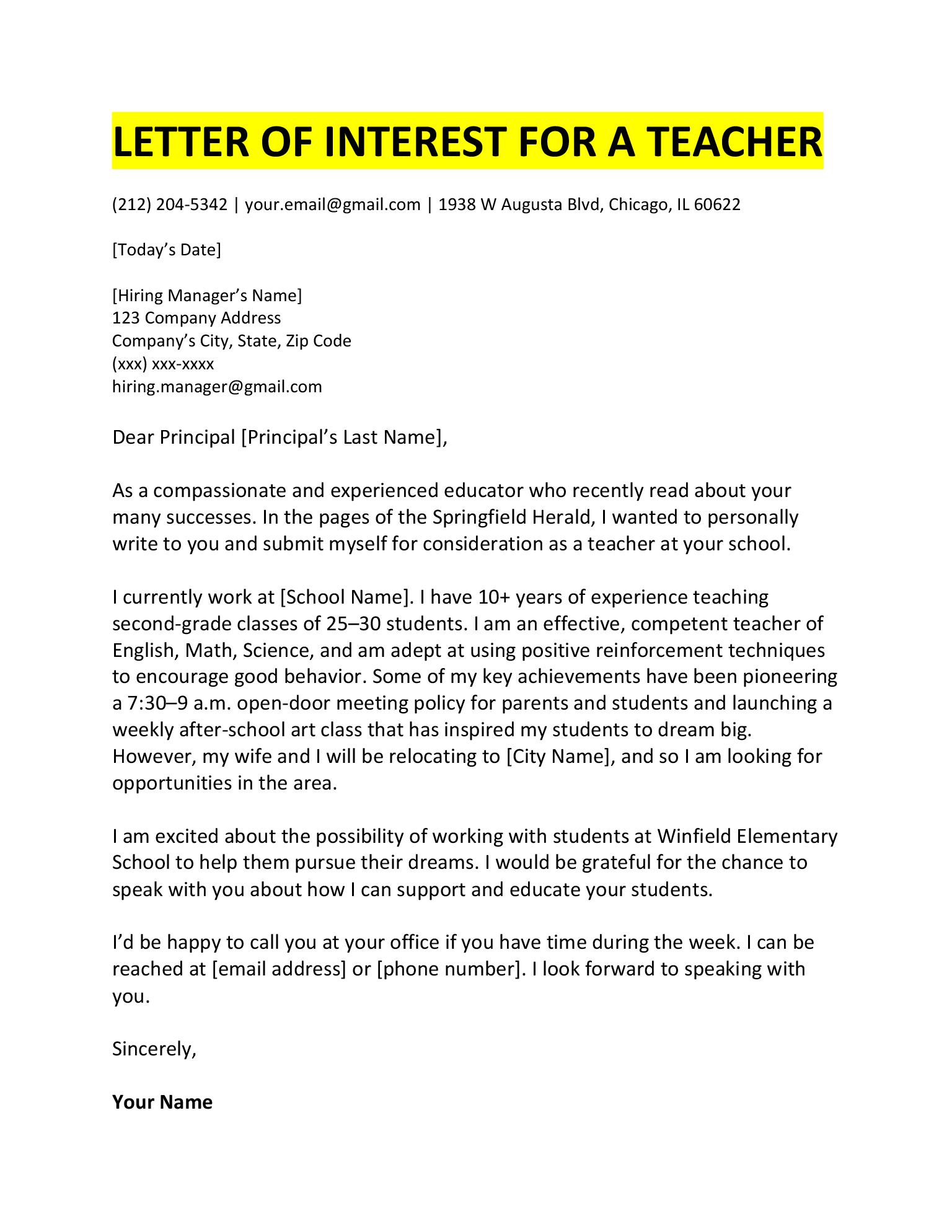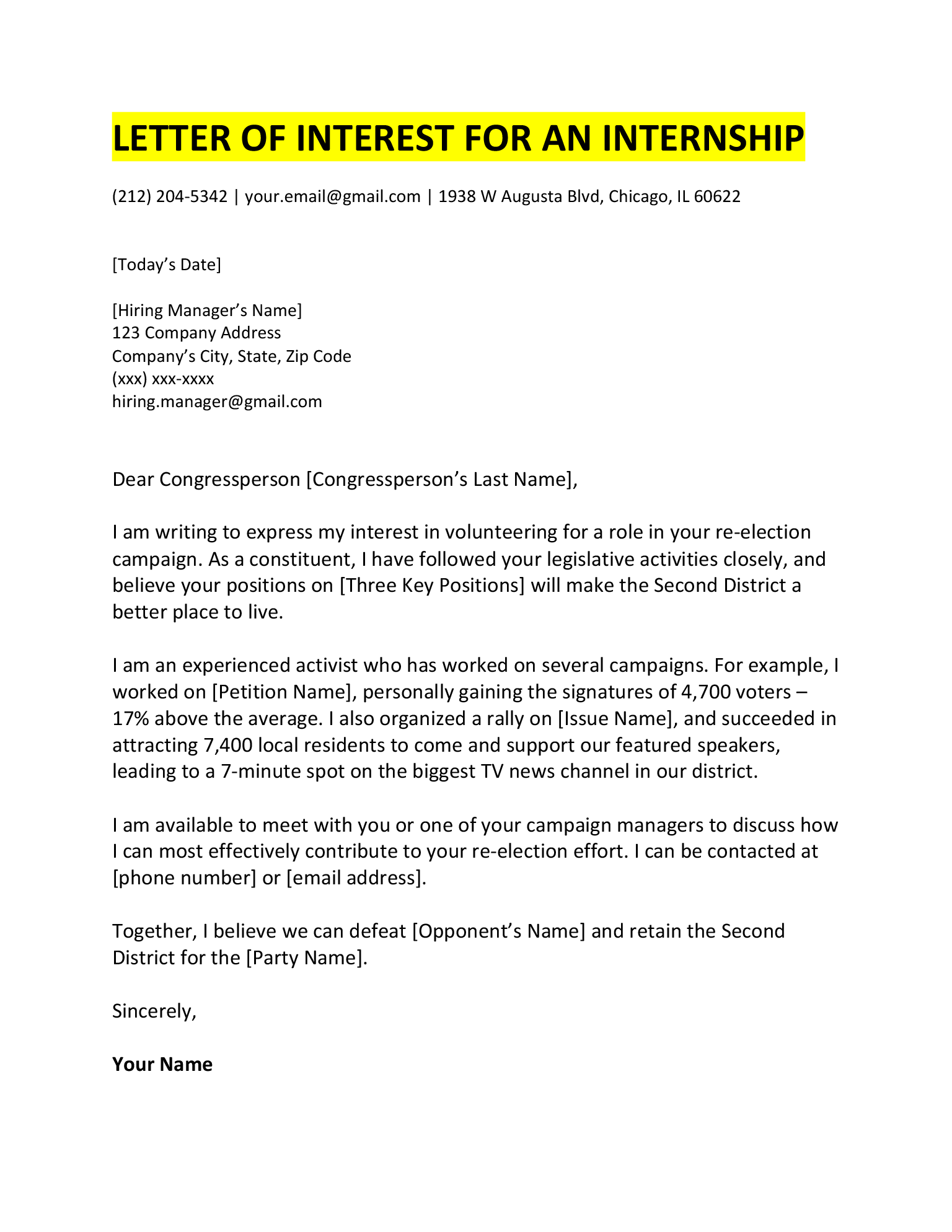Letter of Continued Interest for Employment at Specific Department
Many companies don't advertise all of their positions externally. It can be worthwhile to submit an application to a company that isn't in the midst of hiring. There's a chance they may need your expertise, and you may even be the perfect fit.
If you decide to go this route, you'll need to submit a letter of interest to the desired company (along with your fine-tuned resume). Read on for a concise definition and find out how to write a letter of interest for a job. We've also included some successful letter of interest samples.
What is a letter of interest?
A letter of interest is a letter you write that states your interest in working for a company, even if that company isn't advertising a job opening. It's also referred to as a letter of intent and statement of interest.
Note that a letter of interest is distinct from a cover letter for an internal position, which you use to apply for a promotion or transfer in a company for which you already work.
Letter of interest vs. cover letter
Note there are several differences between a cover letter and letter of interest. In brief, when you write a cover letter, you're targeting a specific role that's been advertised. By contrast, a letter of intent is sent to a company on your own initiative. It should impress the hiring manager so that they'll want to call you in for an interview.
Letters of interest can be sent by anyone at any level of experience. For example, a seasoned employee might have insider knowledge and skills that an employer would appreciate. Or a college grad passionate about a cause might send a letter of intent to an NGO or politician they admire.
Letter of interest template
[Today's Date]
[Hiring Manager's Name]
123 Company Address
Company's City, State, Zip Code
(xxx) xxx-xxxx
hiring.manager@gmail.com
Dear [Mr./Ms./Mx.] [Hiring Manager's Last Name],
In the first paragraph, introduce yourself. Let the employer know who you are, why you're interested in working for the company and what your professional experience is.
The second paragraph should describe your industry-specific qualifications. Include your relevant experience and skills. This is where you want to highlight your most impressive achievements using hard numbers to quantify them.
- If you want to draw attention to several key accomplishments, you can use a bulleted list
- Add numbers to the bullet points to make them more memorable
- Include hard skills that will prove valuable to the company
The final paragraph is your "call to action". Tell the hiring manager how they can reach you (be specific – include your phone number and/or email address), and that you look forward to an opportunity to tell them more about your qualifications. Thank them for their time and consideration.
Sincerely,
Your Name
How to write a letter of interest
Before you write your letter of interest, research your target company and find out about its aims and track record.
If you're happy with what you discover, check whether you have any insider connections at the company that can work to your advantage.
For example, you might have a friend (or even a friend of a friend) working there (it's easy to check on LinkedIn). They can put in a good word for you with the hiring department. Or they might give you some insider tips, like whether the company is currently facing any challenges (maybe ones you could help with).
Spread the word on your social media accounts (LinkedIn and Facebook are good starting points) that you're looking for anyone working at your target company. You never know who may help you. Plus, current employees have an incentive to lend you a hand because they may receive a bonus if you're hired and you included their referral on your cover letter.
How to address your letter
Starting a letter of interest with "To whom it may concern" or "Dear sir/madam" is ineffective. Generic salutations show that you haven't taken the time to research the company's key players.
It's crucial to find out the name of the hiring manager, recruiter, or whoever you're addressing your application to, and use their proper name. The company's website should list this information; if not, check on LinkedIn or Google.
Alternatively, you can try calling the company and asking for the name of the hiring manager. Let whoever picks up know that you'd like to properly address your letter of interest, and you appreciate them taking the time to help you.
Letter of interest format
Since you don't apply for a specific role in a letter of interest, it's not as easy to clarify how you'd be the perfect fit. Instead, you can state how your overall skill set would help the company excel, and provide examples of your past success.
And if there's a specific position you're hoping to land, you should tailor your letter to the position you want by highlighting your relevant qualifications. It's also worth mentioning your area of expertise if it'd help you thrive in the role.
Let's break down the format of a letter of interest by paragraph.
Paragraph 1: Introduce yourself
In the first paragraph of your letter of intent, introduce yourself and spell out what type of work you're interested in. For instance, if you think you'd suit a role in the accounts department, state that here.
Clarify why you're passionate about working for their company, and what hurdles or problems you've identified that you think you can help the company overcome
Make it clear why you're writing to them. State that you know they're not currently advertising, but that you have expertise and job-related skills they don't want to miss out on.
Paragraph 2: Impress the reader with your work experience
The next paragraph needs to leave a positive impression on the recruiter so that they'll remember you in the event a suitable position opens up. Including quantifiable data and tying numbers to your professional achievements is one way of doing just that.
Highlight statistics that show how you've made a positive impact for the companies or projects you've worked on in the past. For example, maybe you increased profits by 47% in your last sales role. Or maybe you signed up 1,740 new clients.
You can also detail major projects you've seen through to the end. Essentially, walk them through your methods and experiences of success. Additionally, touch upon your major hard skills (software, languages, tools, etc.) and soft skills (personality traits that make you a better employee).
And if you're a recent graduate, you can talk up your volunteer experience or extracurricular activities instead.
Paragraph 3: Encourage the reader to reach out to you
The final paragraph of your letter of interest is referred to as the call to action because you're calling on the reader to act. In this case, you want them to call you in for an interview.
Make things easy for the reader. Provide them with your contact details. Your email and phone number should be repeated here even though they'll already be listed on your resume.
Also, state that you're available to come in for an interview at any time. And don't just limit your availability to a formal interview — a quick chat over coffee with a hiring manager can lead to real results too.
Letter of interest examples (for jobs & internships)
Here are three letter of interest samples that have been successfully used to land interviews. You can copy and edit them to match your own background, or simply get ideas from how they're structured.
Letter of interest sample for a job
If you've read something impressive about a company, you might want to send a letter of interest. Check out this letter of intent sample:

Download This Free Template
Letter of interest sample for a teacher
As an educator, you might have been inspired by another school's example. You can enquire whether they have a position with a letter of interest.

Download This Free Template
Letter of interest sample for an internship
Letters of interest are equally as viable for internships and volunteering opportunities as they are for full-time roles.
Our internship statement of interest sample might help you write your own:

Download This Free Template
hoffmanbroubtrall.blogspot.com
Source: https://resumegenius.com/blog/career-advice/letter-of-interest

0 Response to "Letter of Continued Interest for Employment at Specific Department"
Post a Comment